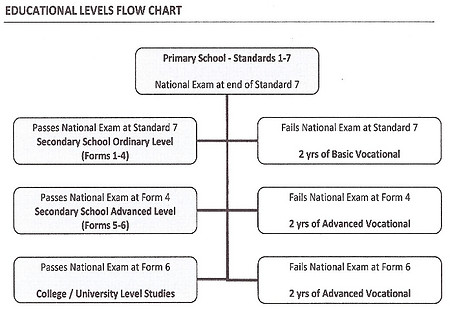Tanzania Education System
The Tanzanian educational system operates on the 7-4-2-3 system: 7 years of primary school, followed by 4 years of secondary school (Ordinary Level) leading to 2 years of Advanced Level. After the 13th year of secondary school students may take the Advanced Certificate exam and attend college for 3 to 4 years. While the national language in Tanzania is Swahili, English is taught, along with Swahili, Math and Science, in Primary Schools. Secondary School students are only taught in English.

PRIMARY SCHOOL:
Tanzanian Primary School, taught in their native language of Kiswahili, is supposed to be free, but the costs of the required school uniforms, school supplies and small school overhead are far beyond many of their means. Students begin in standard one at age 7 and start learning English in standard 1 (as of 2024). The long distance to school for many students (most are much further away than the recommended 3 to 5 kilometers), responsibilities at home, poor health and funding, prevent many children from attending primary school.
National exams are required to move forward beginning after standard 4 and a passing score on the standard 7 exams determine where the student will be placed in secondary school. Students with the best scores and funding may go to boarding schools, usually very far from home, while students with lower passing scores may go to local day secondary schools which can still be very far but less expensive.
SECONDARY SCHOOL:
Secondary school is divided into ordinary, Form 1 -4, and advanced, Form 5-6 and is taught in ENGLISH! Students who do not learn English well in primary school do not succeed in secondary school.
Although the conditions are still harsh in secondary boarding schools with few school supplies, books and long hours in class and requirements to perform chores such as cutting grass and collecting firewood, they are preferred over day schools. Secondary day schools require the students to do homework in unsuitable conditions at home and travel a great distance to get to school and back which is extremely dangerous, especially for the girls, who will often be “attacked and abused” on the way to school. For this reason many girls do not continue their education in secondary school.
Students who pass form four exams may move onto Advanced Secondary School which are mostly boarding schools and more expensive. The exam results dictate the school the student may attend which is chosen by the government. Students who pass form 6 (division 1 being the highest and division 4 the lowest) may continue onto University. The government will assign the University for the student and may loan upwards of 75% of the tuition for those with division 1 results. Universities are 3 years.
Students who fail form 4 or form 6 exams may go onto an Advanced Vocational School and can train to be a head primary School teacher among other things.
